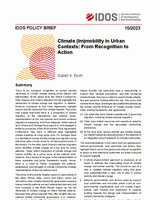Climate (im)mobility in urban contexts: from recognition to action
Ekoh, Susan S.Policy Brief 15/2023
Bonn: German Institute of Development and Sustainability (IDOS)
DOI: https://doi.org/10.23661/ipb15.2023
There is an increased recognition of human mobility responses to climate change among policy-makers and stakeholders. At the global level, the Global Compact for Safe, Regular and Orderly Migration (GCM) highlights this intersection of climate change and migration. In addition, follow-up processes to the Paris Agreement highlight human mobility outcomes from climate impacts. This policy brief argues that while there is a recognition of climate migration at the international and national levels, implementation at the sub-national level where pertinent migration is happening, is far from adequate. At the national level, Ghana and Senegal have signed on and engaged in follow-up processes of the GCM and the Paris Agreement. Furthermore, they have in different ways highlighted climate migration as a key policy area. For Senegal, there is a mandate to include climate change and migration along with three other priority areas for all development plans in the country. On the other hand, Ghana’s national migration policy identifies climate change as a key area for policy attention. These reflect recognition of climate change and human mobility as a policy issue at the national level. However, there appear to be gaps in the implementation of these mandates and policy frameworks locally. Hence, there is a need to further investigate the patterns, weaknesses and strengths of climate (im)mobility strategy implementation at the sub-national level. This policy brief presents insights based on case studies of two West African cities, Accra and Dakar, which are relevant to urban climate (im)mobility governance because human mobility patterns are well established internally and from countries in the West African region, as are the influences of climate change on these mobility patterns. Because cities attract migrants, they offer insights into sub-national climate (im)mobility governance. It is, however, important to note the difficulty of isolating climate change as a driver of human mobility since it interacts with several other drivers (Black, Bennett, Thomas, & Beddington, 2011; Ekoh, Teron, & Ajibade, 2023). Regardless of the drivers of human mobility, city authorities have a responsibility to support their resident populations, and with increasing climate threats, they have a duty to support climate adapta-tion and resilience building within the city. This policy brief outlines three major challenges associated with addressing the human mobility dimension of climate change locally, under existing frameworks and agreements:
(1) City authorities have limited competencies in governing migration, including climate-induced migration.
(2) Cities have limited resources and capacity to adapt to climate change and the associated (im)mobility dimensions.
(3) At the local level, human mobility and climate change are mostly treated as separate issues in the absence of an integrated policy framework on climate (im)mobility.
The recommendations in this policy brief are addressed to national governments, local authorities and donors; they highlight how to move from global and national recognition to action so that cities/local authorities are better prepared to support migrants:
• A whole-of-government approach is necessary at all levels to address the crosscutting issue of climate change and human mobility. This should be part of a new or updated national migration policy that gives local authorities/cities a clear role to play in human mobility and climate change.
• National governments and donors need to support local authorities and non-state actors, such as non-governmental organisations and civil society organi-sations, with funding and investment in capacity building towards the design and implementation of climate (im)mobility strategies.
• Urban action plans should clearly reflect climate (im)mobility strategies given current trends and projections of increased mobility towards cities like Accra and Dakar.


